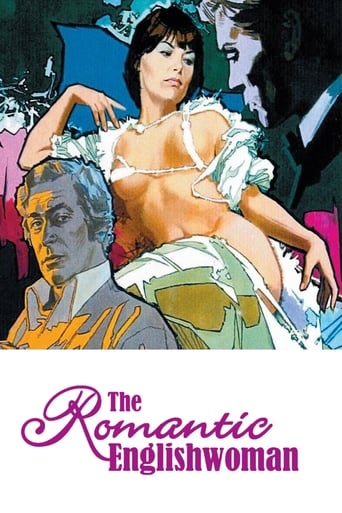Colibel
Terrible acting, screenplay and direction.
Dynamixor
The performances transcend the film's tropes, grounding it in characters that feel more complete than this subgenre often produces.
Tobias Burrows
It's easily one of the freshest, sharpest and most enjoyable films of this year.
Martin Bradley
It may be regarded as minor Losey but it's by no means dismissable and is set once again amongst the Upper Crust and the Hoi Polloi. "The Romantic Englishwoman" of the title is Glenda Jackson, (superb as always), married to novelist Michael Caine, (not at his best here). She's bored by the life she is leading which is no life at all really and he's got writer's block and has turned to writing for the cinema. It begins in Baden Baden where she's gone 'to find herself' and where she meets cocaine smuggling gigolo Helmut Berger, (much too prissy to be a convincing love interest). When she returns to England Berger follows her, landing on her doorstep where Caine welcomes him with open arms planning to make him a character in the film he is writing.It was adapted by Thomas Wiseman and Tom Stoppard from a novel by Wiseman and there is nice streak of dark, and at times very funny, humour running through it though you would be hard pressed to call it a comedy. It wasn't well received when it came out and hasn't been much seen since. Ultimately it's Glenda's film reminding us just how good an actress she could be in a well-written role, here making mincemeat of her co-stars.
George Wright
The Romantic Englishwoman did hold my attention with its opulent settings and actors of stature, Michael Caine and Glenda Jackson, but the story left me confused. In the movie, we see an English woman named Elizabeth on holiday in Germany at a hotel resort in Baden-Baden, where she has a brief liaison with a handsome European named Thomas played by Helmut Burger. Elizabeth is an elegantly dressed and beautiful woman played by Glenda Jackson, who is married to a successful writer named Lewis Fielding, played by Michael Caine. On Elizabeth's return to England, her husband becomes aware of her friend and invites him to tea at their family home in England. Much of what follows seems to be orchestrated by Lewis who is seeking material for his novel. The extent of the "affair" between Elizabeth and Thomas is difficult to judge since they seemed to barely get to know one another, except for a quick sexual encounter in an elevator. Burger, as the Thomas character, maintains an air of mystery while in Germany and later in England as he becomes an assistant to Caine's character Lewis, doing typing and other secretarial work, and letting the nanny become infatuated with him. It seems that he has no real line of work although he purports to be a poet. Instead, he is a gigolo who consorts with underworld figures and is a skillful thief snatching another guest's overcoat, or removing in-room meals for hotel guests. The relationship between Elizabeth and Thomas seems to blossom as a full affair when they return to Europe, this time in Monaco. Thomas continues to be followed by underworld characters while sharing the affections of wealthy women. Burger lacks the acting persona to play alongside Jackson and Caine. Kate Nelligan and Michael Lonsdale are in the cast; however, their roles amount to little. Beautiful settings aside, the acting of Jackson and Caine cannot rescue this story, whatever the story is.
mark-whait
When I first saw this movie in 1992, I always felt it was a lot cleverer, and stronger than many people first thought. After watching it again recently, I still think it has a highly original side to it that still shines through. Caine plays a highly successful writer who becomes obsessed with his wife's (Glenda Jackson) potential infidelity with a handsome German (Helmut Berger) during a recent trip to Baden Baden. Things are more complicated by the fact that Berger suddenly arrives at the Caine household to work as his secretary, and that the movie is full of imaginary scenes that we are led to believe Caine is playing out in his authors' mind. Joe Losey directs in his wonderful trademark style, and although the movie is in danger of being nothing more than an arty, soulless piece, Losey keeps it moving with enough originality to keep the viewer interested - even though it would have benefited from being 20 or 30 minutes shorter. During early scenes, the dialogue is stilted and wooden, but as the movie wears on we realise that Caine and Jackson are actually highly deft at weaving tremendous delivery from the script. Caine's best scene is his rant at his wife's friend Isabel (Kate Nelligan) whilst puffing on a huge cigar, and Jackson shows that the cinema's loss was most certainly the Labour Party's gain. Berger is less convincing, his square jaw good looks not able to support a complex role that probably demanded a better effort, but it's hardly surprising he can't get a foothold in against two acting heavyweights. The Baden Baden backdrop is stunning, and all in all this is a film without doubt one of the most interesting entries in Caine's body of work.
marieinkpen
Is this the worst film ever made (not including Michael Winner's re-make of The Big Sleep which was almost a spoof)? It starts beautifully with Glenda Jackson looking out of a train window over Germany set to lovely music and then it's all downhill from here on in. Glenda Jackson looks stunningly beautiful but Wardrobe obviously had no idea how to dress her in anything that actually suited her, Michael Caine is rubbish as a jealous husband, no subtlety at all & even unsubtle characters require a certain subtlety of acting. He is wholly miscast as an intellectual & a creative type.Occasional flashes of style but the "plot" is muddled & aimless, the script poor, the direction & editing are an utter mess. The whole thing is very 1970s & very difficult to watch without cringing. What an utter waste of time. A hundred minutes of my life that I'll never get back.

